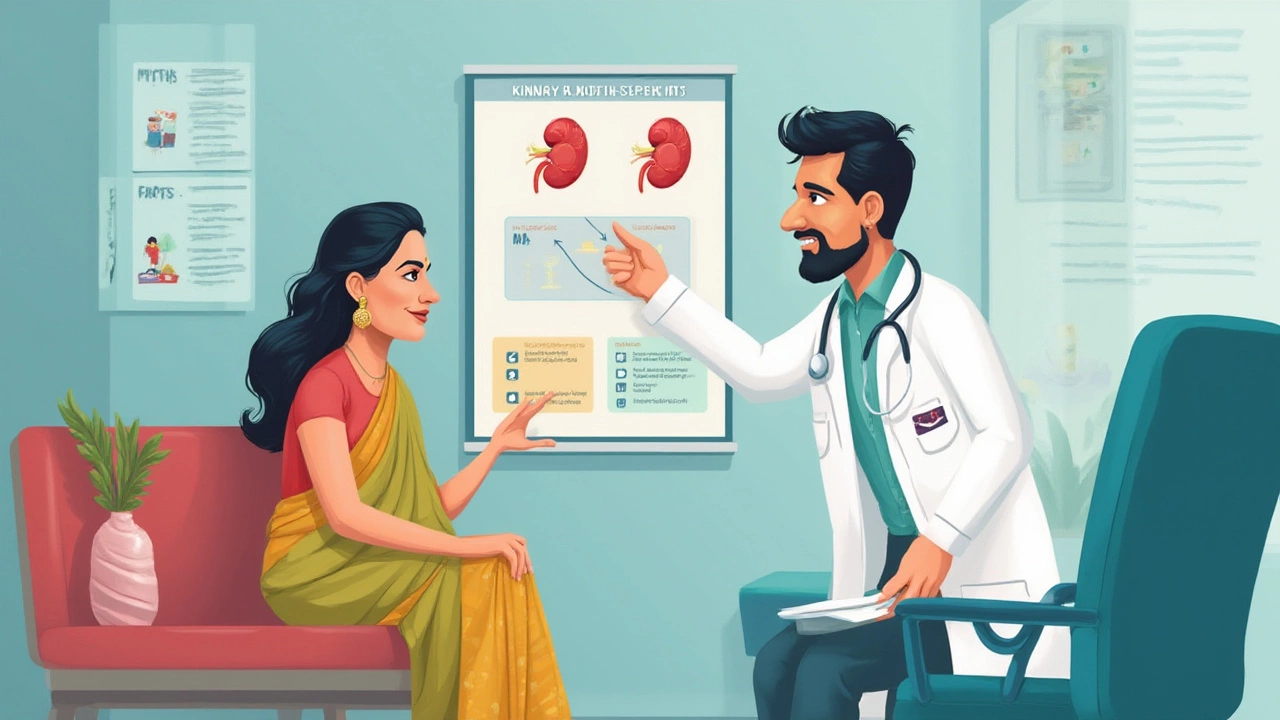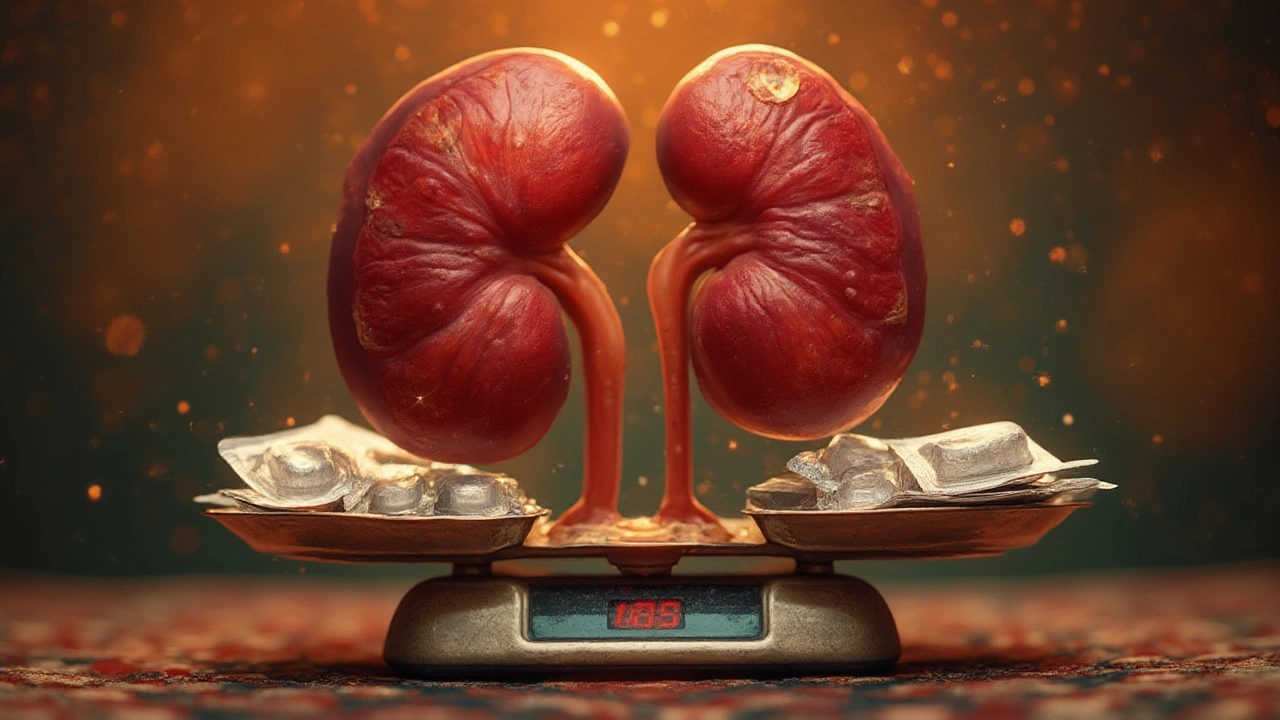
If you’ve ever searched “What organ is metformin hard on?” you’ve probably seen plenty of worried questions. Some people say metformin ruins your kidneys. Others claim it’s perfectly safe. What’s the real answer? Metformin is the blood sugar-lowering champ for millions living with type 2 diabetes. Most people know it as that chalky white pill doctors hand out the moment your sugar creeps up. But with any drug that’s been around this long—seriously, since the 1950s—it’s surrounded by a swirl of myths and caution signs. Let’s break it down and keep things real for a minute here.
How Metformin Works in the Body and Why the Kidneys Matter
Metformin works by helping your body use insulin more efficiently, which lowers the sugar floating around in your blood. It also tells your liver to slow its roll on pumping out extra glucose. But here’s the critical bit: for metformin to get out of your system, it must go through your kidneys. Think of the kidneys as natural filters that process and remove metformin from your bloodstream.
This filtering job is why kidney function is such a hot topic if you take metformin. Taking it isn’t usually a big issue if your kidneys work well. But if your kidneys are struggling—whether from diabetes, blood pressure issues, or age—metformin can linger in your body instead of being cleared out. This build-up increases the chance of rare but serious side effects, like lactic acidosis (more on that in a bit).
So, is metformin hard on the kidneys? Here’s the deal. Metformin doesn’t directly harm healthy kidneys. It doesn’t scar, burn out, or wear down the kidney filters like some painkillers or heavy metals can. Your kidneys just have to work as they were designed: kicking metformin out. But if your kidneys are already in trouble, the risk ramps up. Most guidelines, including current ones from the American Diabetes Association, actually encourage the use of metformin in people with stable, mild-to-moderate kidney disease (chronic kidney disease stages 1, 2, and sometimes 3), provided doctors check kidney function regularly.
Here’s a telling stat: A 2016 review in the Journal of the American Medical Association found little evidence of higher kidney complications among patients using metformin, as long as they stayed within safety guidelines for kidney function. This changed meds from “off limits for kidney patients” to “okay, but keep a watchful eye.”
Now for the confusion bomb: lots of people with diabetes don’t even know how hard their kidneys are working. Kidneys can lose function silently for years while blood sugar and blood pressure chip away at their filtering power. That’s why doctors talk so much about “creatinine” and “eGFR” (estimated glomerular filtration rate)—it’s just a measure of how well your kidneys are keeping up. If your eGFR drops below 30, it’s time for a serious talk about alternatives to metformin.
Let’s put the numbers in a simple table:
| Kidney Function (eGFR level) | Metformin Safety |
|---|---|
| Above 60 | Safe to use |
| 45–59 | Usually safe, monitor yearly |
| 30–44 | Caution, monitor every 3–6 months |
| Below 30 | Not recommended |
Kids, elderly, and people with sudden kidney injury (from dehydration, infections, or contrast dyes) should be extra careful. Always tell your doctor if you need a scan with contrast dye or if you come down with a bad stomach bug, as both can mess with how your kidneys work temporarily.

Common Myths About Metformin and Your Organs
If you’ve ever joined a diabetes forum or even just sat in a busy clinic waiting room, you’ve probably heard the horror stories. Stuff like “Metformin destroyed my organs!” or “My cousin’s kidneys shut down because of it.” But studies—and real-world data—don’t back up most of that fear. Metformin doesn’t directly hammer your kidneys, liver, or heart.
Let’s walk through some of the biggest myths floating around out there and see how they stack up:
- “Metformin causes kidney failure.” Not true for healthy kidneys. If your kidneys are already struggling, any medication they need to filter (including metformin) has to be monitored. Used correctly, and with regular checkups, metformin is surprisingly gentle.
- “My liver will give out because of metformin.” Metformin is processed by your kidneys, not your liver. Unless you’ve got a rare liver disorder, metformin is much lower risk for your liver compared to lots of other diabetes meds or even certain painkillers.
- “It ruins your stomach.” This one has some truth. Stomach upset—bloating, cramps, diarrhea—is common, especially when you first start or when you forget meals. But these side effects often vanish after a few weeks, or they can be managed by taking metformin with food or switching to an extended-release version.
- “You can’t ever drink alcohol on metformin.” This is more about risks stacking up. While small amounts of alcohol probably won’t hurt if your kidneys and liver are healthy, heavy drinking is a no-go. Both alcohol and metformin can, in rare cases, increase your risk for lactic acidosis, a very serious buildup of lactic acid. But again, you have to have multiple risk factors lining up—poor kidney function, dehydration, infection—for this to even be a real danger.
- “Metformin is outdated and less effective.” If anything, metformin is still the gold standard. It’s cheap, well-studied, and reduces diabetes complications like heart attack and stroke if you stick with it.
So where do all these scary stories originate? Fear, misunderstanding, and sometimes confusing coincidence with cause. People with diabetes already have an increased risk of kidney problems simply due to the disease—not the medication. When something goes wrong, it’s tempting to blame the pill first. But if you ask kidney doctors and diabetes specialists, they see plenty of folks who’ve taken metformin for decades with no problems—sometimes even better kidney and heart health over time.
Still, side effects exist. Lactic acidosis is the big scary one, but it’s rare—about 3 out of 100,000 people get it each year, mostly those ignoring severe kidney or heart issues. Other, much less common side effects include vitamin B12 deficiency when taking metformin for years. Easy fix: ask your doctor to check your B12 now and then.

Tips for Safe Metformin Use, Especially If You’re Worried About Your Kidneys
If you’re reading this, you’re probably the cautious type—maybe you want hard answers, or maybe you just want to use metformin as safely as possible. Good news: there are some simple ways you can stack the odds in your favor.
- Don’t skip your kidney checks. Get your blood creatinine and eGFR levels checked at least once a year, or more often if you’re edging toward stage 3 kidney disease (eGFR below 60). People with lower kidney function need checkups every 3–6 months. If your numbers deteriorate, talk with your doctor about whether to reduce your dose or switch meds.
- Recognize the red flags. If you develop sudden vomiting, diarrhea, muscle pain, or trouble breathing—especially if you’re also sick or dehydrated—see a doctor right away. These can be warning signs of lactic acidosis, though it’s very rare.
- Avoid dehydration. Getting sick with the stomach flu, running a marathon, or spending the day outside in the summer? Make sure to drink plenty of fluids. Dehydration stresses your kidneys and can make side effects from metformin more likely.
- Pause before contrast scans. If you need an imaging scan that uses contrast dye (CTs or MRIs), your doctor may want you to hold off on metformin before and after the procedure. This is especially important for anyone with known kidney issues.
- Watch your alcohol. Limit drinking, especially binge drinking. One glass of wine with dinner isn’t the same as a wild night out. Too much alcohol mixed with metformin increases your risk for lactic acidosis—an ugly combination for kidneys and liver.
- Double-check other medicines. Some blood pressure pills, certain antibiotics, and even herbal supplements can interact with metformin or push your kidneys harder. Always share every supplement and over-the-counter med with your doctor or pharmacist.
- Stick with the right dose. Taking more than prescribed won’t lower your blood sugar faster, but it will up your risk for all kinds of side effects. If you miss a dose, don’t double up—just take your next scheduled dose as normal.
- Keep an eye on B12. Long-term metformin use can sometimes lower vitamin B12. Fatigue, numb fingers, and memory fogging up? Those are worth mentioning to your doctor so you can check your levels and supplement if needed.
- Don’t panic if you need to switch. If your kidney function slips, your doc might drop your dose or switch you to another med (like SGLT2 inhibitors or DPP-4 inhibitors). This isn’t the end of the world—it just means you need an approach that fits your body’s new normal.
- Share your full health picture. If you’re starting a new drug, supplement, or even herbal remedy (yes, including those mysterious teas from YouTube videos), tell your healthcare team. Stuff you don’t think is medicine could still hit your kidneys hard.
Something you might find surprising: metformin may actually protect your heart and kidneys over the long run, because it helps keep blood sugar—and by extension, blood vessel and organ damage—under control. People who keep up metformin (along with a good diet and exercise) can see fewer strokes and heart attacks. That’s nothing to sneeze at if you’re playing the long game with diabetes.
The bottom line? If you start metformin, keep your kidney numbers on your radar, know the warning signs, and don’t let horror stories scare you out of an effective treatment. There’s a reason why doctors still write over 90 million metformin prescriptions in the U.S. each year. Whether you’re 30 or 80, a little knowledge and some smart habits can make metformin a safe teammate in your diabetes playbook.





Rohan Talvani
I am a manufacturing expert with over 15 years of experience in streamlining production processes and enhancing operational efficiency. My work often takes me into the technical nitty-gritty of production, but I have a keen interest in writing about medicine in India—an intersection of tradition and modern practices that captivates me. I strive to incorporate innovative approaches in everything I do, whether in my professional role or as an author. My passion for writing about health topics stems from a strong belief in knowledge sharing and its potential to bring about positive changes.
view all postsWrite a comment